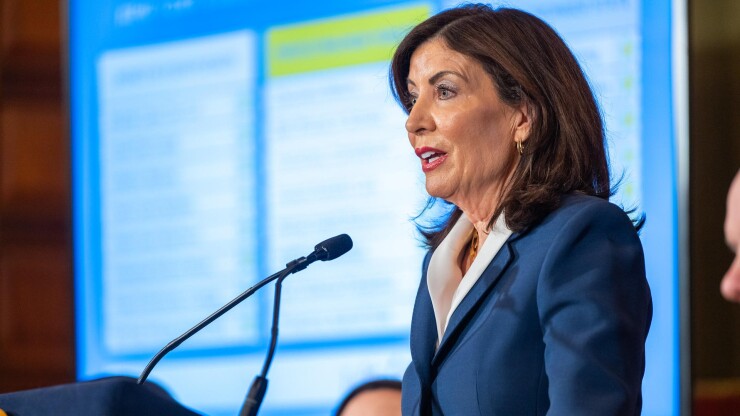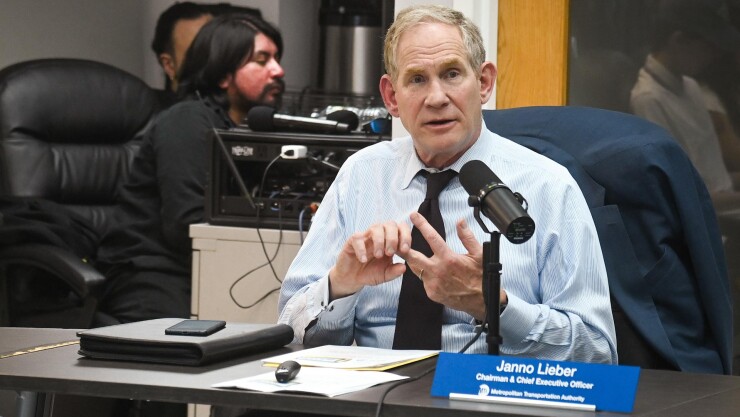
New York Gov. Kathy Hochul has announced a "general agreement" with state lawmakers on a budget that aligns closely with her policy agenda.
The budget, which was due on April 1, still has not received a vote in the legislature, nor were any documents released in the days following the April 28 announcement. But Hochul said several big-ticket items, and the final price tag, have been worked out in negotiations.
"Despite the chaos and uncertainty that's just constantly emanating out of Washington, we still delivered for the people of New York," Hochul said. "We still got it done and I would not take that for granted."
New York has a Democratic trifecta, which doesn't mean the governor historically
This year they are contending with a hostile Republican-run administration and Congress in Washington.
Uncertainty about the federal government led lawmakers to trim several programs. However, the budget still relies heavily on federal spending, and Hochul said the legislature may need to reconvene later in the year if that spending is cut.
The $254 billion budget will include tax cuts and "inflation refund" checks Hochul proposed in
Hochul's announcement may have come as a surprise to legislative leaders, who earlier that day suggested the negotiations were far from over.
Assembly Speaker Carl Heastie
The budget is $17 billion larger than
The budget agreement includes items from what Hochul calls her "affordability agenda," she said at Monday's news conference: a small middle class tax cut, a larger child tax credit, universal school lunches, and "inflation refund" payments to taxpayers from the state's fiscal 2025 tax revenue surplus.
The governor's executive budget
Hochul did not discuss out-year budget gaps or revenues that could plug them in her press conference. CBC Director of State Studies Patrick Orecki said it's hard to fully evaluate the budget agreement based only on Hochul's perspective.
"When we have the bills and the financial plans that make up the true budget, that's where we'll find the things that are probably a little less positive," Orecki said.
Lawmakers also reached an agreement to fully fund
At Wednesday's MTA board meeting, CEO Janno Lieber said he was "ecstatic" about the deal.
"This is a huge moment for the MTA," Lieber said. "What Albany has done is said, 'We're going to make a massive investment in New York.' And the investment's going to benefit the riders.'"
The deal requires the MTA to find $3 billion of savings, which Lieber said will likely come from its capital plan.

Throughout negotiations, lawmakers shifted items in the budget to adapt to pressing needs, Hochul said. They added $400 million for childcare and $700 million to address a
The inflation refund checks will be smaller than Hochul envisioned — $2 billion total rather than $3 billion — because she is now less confident about
"I had to step back and say, 'The world has changed dramatically since inauguration day,'" Hochul said. "When I put forth my budget, and my focus was trying to alleviate the pain that families were going through … I could not have foreseen the upheaval in our economy."
Around $400 million of proposed programs were dropped from Hochul's executive budget, said Budget Director Blake Washington. Other programs the administration had planned to expand will stay the same size.
The agreement will leave the state's reserves level at $21 billion, Hochul said.
But the CBC said the governor should have gone farther. Orecki recommended setting aside around $2 billion to plug potential federal cuts.
"It's a tough spot for the state to be in, to their credit," Orecki said. "But it'll be a challenge if you come back mid-year, with all of the spending that they've added, and have to claw back funding, or come up with some other way to fill holes."
New York has already lost more than a billion dollars of federal funds. The state is involved in a lawsuit over rescinded education grants, and FEMA pulled emergency preparedness funds from New York earlier this year.
The state and the MTA are also in a
"We've already been hit with over $1.3 billion in cuts," Hochul said. "This may just be the tip of the iceberg, and the scale of these potential cuts is simply too massive for any one state to absorb."
New York's biggest source of federal funds is Medicaid, which comprised
At the governor's news conference, state Director of Operations Kathryn Garcia questioned the political feasibility of Medicaid cuts.
"The real driver of [Medicaid costs] is people using Medicaid. So if you are going to cut Medicaid, you are cutting the eligibility of people," Garcia said. "I don't think it's a done deal. I think it will be very, very hard for some people to cast that vote, to literally cut people off of health insurance."





